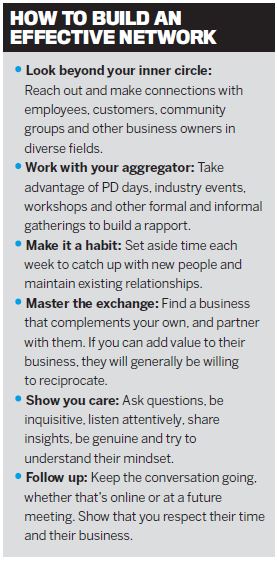Building a supportive network will improve brokers' wellbeing and attract new customers

Building a supportive network will improve brokers' wellbeing- and attract new customers
Forming connections is the bread and butter of what brokers do. Building relationships and cultivating a network of personal, professional and community contacts is integral to sourcing future leads and referrals. For the 40% of brokers who work as sole operators, it also ensures they feel less isolated in their jobs.
The definition of an effective network continues to evolve and is perceived differently depending on the business and its goals, says FAST CEO Brendan Wright.
For instance, a new-to-industry broker might seek to establish mentoring relationships, while an established broker might be looking to partner with someone who can offer a complementary service that will take their business to the next level.
Regardless of what an effective network means to brokers, the benefits are clear.
“Developing meaningful professional relationships is proven to provide opportunities to grow and diversify businesses, deepen knowledge and foster innovation through diversity,” Wright explains.
That said, it doesn’t mean networking always comes naturally to brokers.
“I think most people feel some degree of trepidation when meeting with those they don’t know well,” Wright says.
Most of those who are attracted to broking will probably already have the soft skills required to meet and build connections with new people. They just need to remember to move away from a sales pitch and instead focus on establishing a genuine connection, he says.
“The key is to consistently connect with people, both those that brokers know and those they don’t, inside and outside of the industry. Here they can share insights, be inquisitive, listen with care, and enable their connections to build, grow and succeed.”
Partnering with the right aggregator also help facilitate those conversations make the experience more comfortable.
At FAST, brokers are encouraged to attend regular professional development events and forums, as well as those of lenders industry associations, so they can get to know their colleagues in both formal and informal settings, build contacts across the channel and share insights with their peers.
.JPG) “The key is to consistently connect with people, both those that brokers know and those they don’t, inside and outside of the industry” Brendan Wright, FAST
“The key is to consistently connect with people, both those that brokers know and those they don’t, inside and outside of the industry” Brendan Wright, FAST
In turn, this helps brokers develop broader capabilities within their businesses and create strategic business-building opportunities, Wright says.
Making connections is something brokers should prioritise and embed in their business culture by setting aside time each week connect with others and maintain existing relationships, he says.
They should also look to their aggregator as a resource on this front. FAST’s partnership managers support their brokers in establishing new and different professional relationships. They work with brokers, lenders, industry bodies and partners to set up regular and more intimate workshop-style sessions. “These sessions have targeted content and the potential to enable brokers to learn from each other and establish solid working relationships that create value,” Wright says.
“We also have strong connections outside of finance broking and can help brokers to establish diverse connections with professionals to differentiate and deliver more to their clients.”

Going for coffee might be the first step towards building a positive rapport, but fostering long-standing connections can genuinely help brokers grow their businesses, create advocacy and deliver a broader range of client solutions.
Broker businesses that traditionally work in the commercial lending space, for instance, might find it worthwhile to establish connections with home lending specialists through referral arrangements, or by adding them as in-house specialists to better meet the home and investment needs of their business-owner clients.
Brokers who surround themselves with a wide yet relevant range of subject-matter experts, such as accountants, investment advisers, property consultants and legal advisory services, can build on the foundation they’ve already established, Wright says.
“Brokers might also want to consider getting to know different industry segments and their governing bodies to identify opportunities to attend events and develop broader capability in their business. And of course, connecting digitally through social media has become a powerful way for brokers to reach new markets.”
“Developing meaningful professional relationships is proven to provide opportunities to grow and diversify businesses, deepen knowledge and foster innovation” Brendan Wright, FAST
When deciding whether to partner with an associate, it’s important to try to understand their mindset by asking plenty of questions, Wright says.
“You can evaluate if there are any areas where you can add value to their business. You will usually find that, if you do this, the other party will reciprocate.”
A good example of this is a broker-accountant relationship. This sort of partnership allows the accountant to meet more of their clients’ financial needs, improve client retention, increase revenue per client, and ultimately drive customer advocacy.
Likewise, for the broker it can lead to a new source of clients, revenue growth, and longevity of clients and business partners.
In the end, when it comes to establishing a supportive network of contacts, brokers should show they genuinely care, Wright says.
“Share insights, be inquisitive, listen and understand. If you meet someone you would like to connect with again, be sure to follow up in a way that shows a respect for their time and business.”



